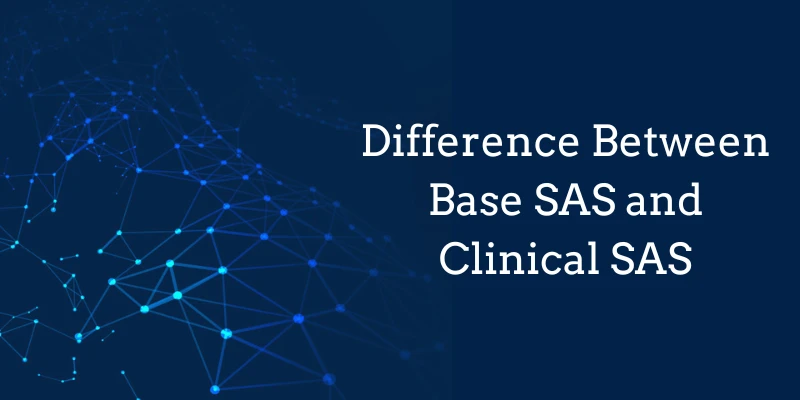
SAS provides two main analytics modules: Base SAS for general data manipulation, statistical analysis, and reporting, and Clinical SAS for pharmaceutical and healthcare applications, focusing on regulatory compliance, clinical trial data management, and specialised reporting in drug development. Whether you’re a beginner or looking to specialise, enrolling in a SAS Training in Chennai program can give you a solid foundation to master both. In this blog, we will explore what is the difference between Base SAS and Clinical SAS.
What Is Base SAS?
Base SAS is the foundational module of the SAS ecosystem, providing data professionals with robust tools for everyday analytics. With Base SAS, you can import diverse datasets whether from CSV files, Excel spreadsheets, or relational databases and clean or merge them efficiently. It offers a suite of statistical procedures, such as regression analysis and hypothesis testing, that enable insightful data exploration.
You’re upgrading your skills with Clinical SAS Training in Chennai, enhancing your expertise and practical know-how. Moreover, Base SAS includes powerful reporting capabilities through the Output Delivery System (ODS), allowing you to generate publication-quality tables and graphs without leaving the programming environment.
What Is Clinical SAS?
Clinical SAS extends Base SAS by embedding specialized functionality tailored to the rigors of pharmaceutical and healthcare research. It’s designed to handle clinical trial data in compliance with strict regulatory standards, such as CDISC’s SDTM and ADaM models. Clinical SAS programmers prepare datasets for submission to authorities the FDA or EMA, ensuring all variables, formats, and metadata meet required specifications.
Join our Training Institute in Chennai offering SAS courses to gain hands-on experience and in-depth knowledge for a successful data career.
Core Functional Differences
While Base SAS and Clinical SAS share underlying language elements, their primary use cases diverge significantly. Base SAS focuses on broad data manipulation and statistical reporting applicable to finance, retail, manufacturing, and academia. In contrast, Clinical SAS zeroes in on the intricacies of clinical trial workflows, emphasizing regulatory compliance and specialized deliverables such as define.xml files and annotated case report forms.
Base SAS procedures PROC SORT and PROC MEANS give way in Clinical SAS to domain-specific routines PROC CDISC and procedures for generating clinical trial graphics. Consider joining our Oracle Training in Chennai to receive top-quality coaching and build a successful, future-ready career in the tech industry.
Skills and Certification Paths
To excel in Base SAS, you must master DATA and PROC steps writing DATA steps to manipulate records and using procedures for analysis or reporting. Familiarity with ODS for output customization and proficiency in the SAS Macro language for automation are essential. Many professionals begin with the SAS Certified Base Programmer credential to validate these skills.
By comparison, Clinical SAS practitioners build on Base SAS expertise and add knowledge of CDISC standards, submission formats, and clinical data validation. They often pursue the SAS Certified Clinical Trials Programmer certification, which covers SDTM and ADaM mapping, safety listings, and submission-ready reporting.
Career Opportunities
Base SAS skills open doors in a wide array of sectors: banking and finance for risk modeling, retail for demand forecasting, manufacturing for quality control, and academia for research analysis. In each, Base SAS professionals leverage their data manipulation and statistical abilities to drive decision-making.
On the other hand, Clinical SAS experts are in demand at pharmaceutical companies, contract research organizations (CROs), and regulatory agencies. Their specialized expertise in clinical data handling and compliance commands premium salaries and positions of critical responsibility within drug development teams.
Both Base SAS and Clinical SAS harness the same core programming environment but cater to different needs. Base SAS delivers versatile analytics capabilities ideal for general data work, while Clinical SAS provides the domain-specific tools required for rigorous clinical trial programming and regulatory submissions.
Also Check: What are the Functions of Clinical SAS?